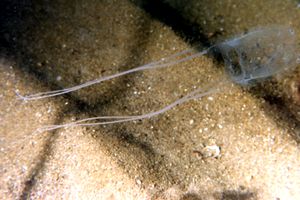
Box jellyfish are cnidarian invertebrates distinguished by their box-like body. Some species of box jellyfish produce potent venom delivered by contact with their tentacles. Stings from some species, including Chironex fleckeri, Carukia barnesi, Malo kingi, and a few others, are extremely painful and often fatal to humans.

Carybdea is a genus of venomous box jellyfish within the family Carybdeidae that currently consists of a total of 8 species. This genus of jellyfish are often found in warm waters around the world in waters such as the Mediterranean Sea, the Pacific Ocean, and off the coast of Africa. Their sting can cause a range of effects depending on the species. These invertebrates will go through both sexual and asexual reproduction as they transform from a polyp to medusa. Carybdea have a box-shaped bell with four tentacles and eye-like sensory structures. There are distinct physical markings that differentiate many species within the genus. While Carybdea use their venom to act as predators, they are also preyed on by turtles and various fish. They feed on plankton, invertebrates, fish, and some crustaceans.

The Nyiro shrew is a species of mammal in the family Soricidae. It is endemic to Mount Nyiro in northern Kenya. This is a small shrew with dark brown dorsal pelage and grayish brown or slate gray ventral pelage.

Anisotremus is a genus of grunts native to the eastern Pacific and western Atlantic Oceans. The name of this genus is compound of anisto meaning “different” and tremus meaning “hole”, referring to the different sized paired pores on each side of the head.
Plazi is a Swiss-based international non-profit association supporting and promoting the development of persistent and openly accessible digital bio-taxonomic literature. Plazi is cofounder of the Biodiversity Literature Repository and is maintaining this digital taxonomic literature repository at Zenodo to provide access to FAIR data converted from taxonomic publications using the TreatmentBank service, enhances submitted taxonomic treatments by creating a version in the XML format Taxpub, and educates about the importance of maintaining open access to scientific discourse and data. It is a contributor to the evolving e-taxonomy in the field of Biodiversity Informatics.

Carybdea marsupialis is a venomous species of box jellyfish, in the small family Carybdeidae within the class Cubozoa.

Alatina is a genus of box jellyfish within class Cubozoa. It is the largest of the three known genera in the family Alatinidae, and the only one which is not monotypic. It contains the following ten species:
Nausithoe challengeri is a species of crown jellyfish in the family Nausithoidae. Adult medusa are believed to be up to 12 millimeters in diameter, and the specimen has long and thin tentacles.
Nausithoe globifera is a species of crown jellyfish in the family Nausithoidae. The species is ~22 millimeters in diameter, 10 millimeters of which is composed of the central disc.

Nausithoe rubra is a species of crown jellyfish in the family Nausithoidae. Adult medusa are believed to grow up to ~15 millimeters in size, and the species may be distributed worldwide. Species is confirmed to be in the East Atlantic, but may also reside in other oceans.
Nausithoe thieli is a species of crown jellyfish in the family Nausithoidae. The species can be found in the Mediterranean Sea and Western Indian Ocean.

Carybdea brevipedalia is a venomous species of cnidarian, in the small family Carybdeidae within the class Cubozoa. The species is largely concentrated off the coast of Japan, but has also been observed in the waters near Korea.
Carybdea arborifera is a venomous species of cnidarian, in the small family Carybdeidae within the class Cubozoa. The species is rarely seen, but has been observed off the coast of Hawaii.

Carybdea rastonii is a venomous species of cnidarian, in the small family Carybdeidae within the class Cubozoa. They are usually observed near Hawaii and Australia, but have in rare cases been documented off the coasts of California.
Carybdea wayamba is a venomous species of cnidarian, in the small family Carybdeidae within the class Cubozoa. The species is rarely seen, but has been observed off the coast of Sri Lanka.

Pachycerianthus delwynae is a species of tube-dwelling anemone in the genus Pachycerianthus. The species can be found in the Pacific Ocean, off the coast of New Caledonia.

Ceriantheomorphe brasiliensis is a species of tube-dwelling anemones in the family Cerianthidae. Very little is known about the species.
Photonectes barnetti is a species of deep-sea fish in the genus Photonectes. The species is distributed across the Pacific Ocean, and adults can reach a maximum length of ~4.2 centimeters.
Photonectes cornutus is a species of deep-sea fish in the genus Photonectes. The species can be found in the central Atlantic Ocean, and adults can reach a maximum size of ~1.9 centimeters.
Photonectes gorodinskii is a species of deep-sea fish in the genus Photonectes. The species has been observed in the Pacific Ocean, and adults can reach a maximum length of ~18 centimeters.










